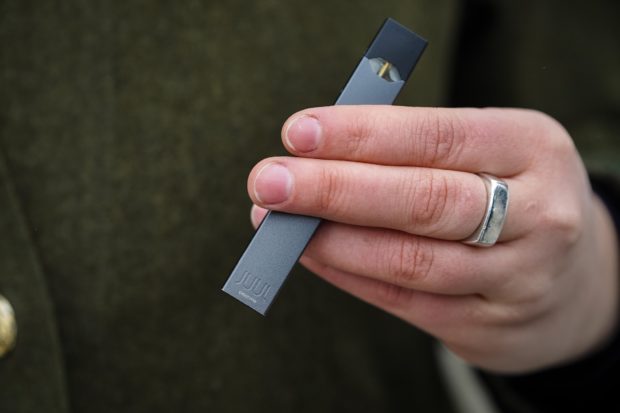Smoking pod-based e-cigs might make users more hooked on nicotine

A pod-based e-cigarette. Image: Josie_Desmarais/IStock.com
New research has found that pod-based e-cigarettes such as JUUL may promote a greater dependence on nicotine than other types of e-cigarettes.
For the new study, researchers at Harvard T.H. Chan School of Public Health and the Dana-Farber Cancer Institute, United States, along with Konkuk University in South Korea, reviewed 35 articles that had investigated pod-based e-cigarettes, including analyzing their product design, biological effects, marketing and social media messaging, who used the products and how they were perceived.
The team found that, although the pod-based e-cigarettes may contain lower levels of harmful ingredients than conventional tobacco cigarettes, there is no evidence that even lower levels are safe for younger users.
In addition, the team also found that the design of these particular e-cigarettes delivers nicotine more efficiently, giving users a high dose of nicotine in a low pH form. As this is less harsh than the higher pH nicotine found in most other e-cigarette brands, it encourages users to take deeper inhalation, which in turn could make them more dependent on nicotine than with other types of e-cigs.
The researchers note that in one of the studies, the level of nicotine exposure in teens using pod-based e-cigarettes was higher (245 nanograms per milliliter) than levels detected in adolescents who smoked regular cigarettes (155 ng/ml).
The findings, which were published on Monday in JAMA Pediatrics, also showed that social media marketing campaigns for pod-based e-cigarettes have specifically targeted youth and young adults more than campaigns by other e-cigarette devices and gave messages which focused more on the lifestyle appeal of these products, rather than how to use them as a tool to quit smoking.
“We found that pod-based e-cigarettes have a higher potential to get youth and young adults addicted than other devices,” said first author Stella Lee. “To prevent this from happening, we need stronger health communication messages that alert people to these findings.”
Pod-based e-cigarettes, which are designed to be sleek and easy to conceal, use replaceable nicotine cartridges that come in pleasant flavors such as mango and mint. JUUL is the big brand on the market but other pod e-cigarettes include Suorin, Bo, Phix and Vuse Alto.
The researchers note that recent data has shown that e-cigarette use in teens has increased substantially since the pod-based e-cigarettes hit the market.
JUUL responded to the research with a statement: “As the authors note, this article is limited to a review of prior publications, and therefore does not include any new data. We agree with the authors that those underage should not be using vapor products, and that marketing of such products should be restricted. Our customer base is the world’s 1 billion adult smokers and we do not want to attract underage users.
“Providing a similar nicotine effect and experience to combustible cigarettes is critical to facilitate an adult smoker’s transition from combustible use. Our clinical studies demonstrate a nicotine absorption curve for the JUUL system that is competitive with, but lower than, a combustible cigarette.
“We are committing all necessary resources to submit a scientifically rigorous PMTA designed to provide FDA with the science and evidence needed to assess the role our products can play in moving adult smokers away from cigarettes, while combating underage use.” IB
RELATED STORIES:
Vaping? Beware: Hard facts on a life-threatening habit
Vaping e-cigarettes could increase the risk of oral disease, study finds